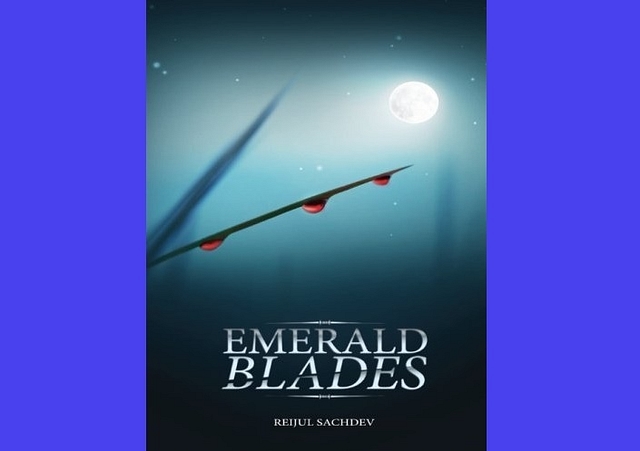
Emerald Blades: A Haunting Voice That You Must Listen To
This is a review of a book of poems written by a “borderline-schizophrenic” 22-year old.
Some of the poems will scare you, some of them will enchant you, but all of them will make you look inward.
I hardly read poetry, though I have five or six books of poetry on my bookshelves which I fully intend to read some day—maybe post-retirement. The only poems I can confidently claim to have read after my Class XII board exams (when reading poetry was somewhat equivalent to dissecting anaesthetised frogs) are by Edward Lear, Ogden Nash and E. E. Cummings. Eliot, Eats (hate that autocorrect—Yeats) and Auden wait in study, glowering.
And then. A few weeks ago, I encountered Emerald Blades by Reijul Sachdev, a 22-year-old engineering student who describes himself as a “borderline schizophrenic”, and says that “in every freak, there lives a Superman”.
Some of the poems of Emerald Blades were mailed to me by his father, who is the sort of friend whom one meets once in every five years. I have met Reijul for a total of about 10 minutes in his (and my) life—once when he was three, and once he was 19. So this is not a plug, when I say unequivocally: Read Reijul’s poems.
I bought the book with my own money when it was published, when I could have easily got a copy from either my friend or the publisher.
End of Disclaimer.
Some of Reijul’s poems will scare you, some of them will enchant you, but all of them will make you look inward.
‘Tis a wonderful feeling,
To stand beside the edge
And wonder as you plummet,
If Fate had carved a ledge?
Or
Herein lies a beauty whose sight
Can scar forever your soul
And wound you with every breath,
While making your life whole.
Reijul’s poems are clearly influenced by the British Romantic poets, especially Keats. Words like “’tis” and “doth” appear frequently. But so do “wild things” and “insanity” and “madness” and “falling”. However, like there is “the edge”, there is also “the sky”. The sensitivity of the poet comes through poignantly. That sensitivity needs to be nurtured as a very precious asset. For he is only 22.
Perhaps I’m being slightly pedantic here, but it’s totally refreshing to read poems that follow certain old-school technical rules. They rhyme! And the poet does not indulge in any stunts and gimmicks that pretend to be art, because the thing today is: If you don’t understand what the hell the poet is saying, you assume it must be some sublime s**t. Whereas in most cases, it’s just s**t :-)
There is a genuinely talented poet here, one who is thoughtful, who intimately knows both love and dread; a mind where light and shadows compete; and also a heart which is truly imaginative (I purposely use the word “heart” and not “mind” here; it’s usually the “mind” which is supposed to be the seat of imagination), a heart that dreams.
There is romanticism, and there is a love for the mythic (references abound to the Iliad and King Arthur and Oedipus), but, I can’t help saying, there is also grave and disquieting disquiet.
Yes, he wakes to setting sun
And never once has cried
Is he who feels the heady pull
Of seductive suicide.
Or
I place the barrel against my temple.
The cold steel sparks off something
And my head is filled with thoughts—
Both of how empty life will now be
And how beautiful every moment was.
I pause—paralysed by indecision.
And then, I remember.
This is a compelling lonely voice, and a voice that is quite its own. There is anguish here, and the paranoia, and the wild things are always round the corner, just out of sight, or just behind you and they will be gone every time you turn around. All existence, all thought systems, have edges, and only a few of us notice them. Those who do, have the choice to avoid them. Only a very few would take that one step that doesn’t land on familiar and unexamined ground, and fall into the haloed abyss, like “a patter of raindrops”.
Reijul’s book of poems is extraordinary. His is an original voice that fearlessly speaks of the questions that trouble him, the demons that haunt him, and the whispers that have occupied his mind and refuse to pay rent. He is only 22. I cannot begin to imagine the threats to our comfort and smugness that he will issue in the next few year.
But then again, that’s happiness:
To find a moment of terrible pain
When saying goodbye to the exquisite,
Then, go back and do it again.